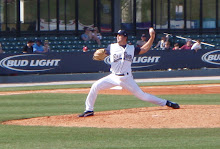Hitter's are born to hit the fastball. They are bread from the first day of Coach pitch to hit the straight ball. Generally, hitting the breaking ball is a skill that is acquired by some of the better hitters at every level. Weather its high school, college, or the pros, hitting the off speed pitch is an acquired skill that takes years of dedication. Of course there are other types of hitters who attempt to get by just waiting and working the count to get the straight one. In scouting reports, these guys are typically described as "dead red" or "first pitch fastball" hitters. Also, many scouting reports ON pitchers will show a pitcher's tendency to throw a lot of off-speed stuff or that he possibly throws fastballs early and soft stuff late. Any of these scenarios would represent good situations to "pitch backward."
So, what does pitching backward mean? Essentially, it is a pitching strategy that entails throwing fastballs in breaking ball counts and breaking ball counts. For example, most first pitches of an at bat are expected to be fastballs, so a hitter would be ready and looking for the fastball. Here's a perfect opportunity to spin a breaking ball in for a strike. Most hitters will be on their front foot and just take the pitch...looking for the holy grail (fastball). On the flip side, if you have a hitter who works the count to a 1-2 or 2-2 situation after a variety off-speed stuff, this would be another perfect opportunity to ring him up with an fastball. I am personally a huge fan of an inside fastball here that can "freeze" the hitter for strike three. Middle counts don't lend themselves as much to pitching backward. Basically, you can do what you want to get to the '2-strike' count. Of course, you don't want to fall into a pattern when setting up hitters. But that's a post for another day. Just be aware of counts where you think a hitter might be looking for a fastball and throw a breaking ball and vice versa.
So there we have it. Not the longest post ever...but the point is essential to get the better of the more advanced hitters you may face. A good pitcher must know his hitters and be able to read hitters he doesn't know. This is definitely an advanced topic, but its one that all pitchers must address.
Always comment if you have any questions.
Until Next Time!!
Subscribe to:
Post Comments (Atom)

No comments:
Post a Comment